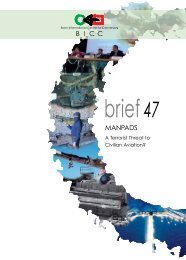egypt-final-presidential-elections-2012
egypt-final-presidential-elections-2012
egypt-final-presidential-elections-2012
Create successful ePaper yourself
Turn your PDF publications into a flip-book with our unique Google optimized e-Paper software.
The Carter Center<br />
Presidential Election in Egypt<br />
Muslim Brotherhood or the Mubarak regime-affiliated<br />
candidates. Instead, they supported candidates who<br />
were either explicitly “revolutionary” and had a long<br />
history of opposition to the Mubarak regime or ones<br />
who were at the very least moderate and reformist.<br />
The emergence of this “third camp” underlined that<br />
many Egyptians did not feel represented by either a<br />
Muslim Brotherhood candidate or a Mubarak regimeaffiliated<br />
candidate. Ultimately, however, the two<br />
candidates with the most well-established political<br />
machines prevailed, and voters faced a polarizing<br />
choice in the second round.<br />
Political Developments Between<br />
the First and Second Rounds of<br />
the Election<br />
While not exclusively related to the election, several<br />
events with an important impact on Egypt’s ongoing<br />
transition unfolded in the<br />
interim period between the<br />
first and second rounds of<br />
the election. Their timing<br />
contributed to a growing<br />
dissatisfaction with the<br />
electoral process as well<br />
as continued uncertainty<br />
about the role and meaning<br />
of electoral processes in<br />
the context of the militaryorchestrated<br />
transition,<br />
leading to calls for a boycott<br />
and vote-spoiling campaigns.<br />
In the weeks between the<br />
two rounds of polling, the SCAF renewed pressure on<br />
political forces to secure an agreement on the composition<br />
of the constituent assembly to be appointed<br />
by Parliament and the guidelines for drafting a new<br />
permanent constitution. The ruling military council<br />
initiated negotiations between the non-Islamist and<br />
Islamist parties on the composition of a new constituent<br />
assembly, against the backdrop of the looming<br />
In the weeks between the two rounds<br />
of polling, the SCAF renewed pressure<br />
on political forces to secure an<br />
agreement on the composition of the<br />
constituent assembly to be appointed<br />
by Parliament and the guidelines for<br />
drafting a new permanent constitution.<br />
case before the Supreme Constitutional Court that<br />
threatened to dissolve the Parliament and the SCAF’s<br />
announcement that it might unilaterally amend the<br />
Constitutional Declaration in order to further define<br />
the powers of the presidency. The negotiations,<br />
however, ended with an impasse when non-Islamist<br />
members of the constituent assembly walked out<br />
after accusing the Islamists of not holding up their<br />
end of the bargain to have an assembly composed of<br />
no more than 50 percent Islamists. They objected<br />
to the fact that moderate Islamist parties and some<br />
religious institutions were given seats on the assembly<br />
from the half of the body theoretically reserved for<br />
non-Islamists.<br />
On June 14, <strong>2012</strong>, only two days before the<br />
second round of voting in the <strong>presidential</strong> election,<br />
the SCC ruled that the Political Exclusion Law<br />
passed by Parliament in May <strong>2012</strong> and signed by<br />
the military council to exclude high-ranking former<br />
regime officials was unconstitutional.<br />
After Ahmed<br />
Shafiq appealed to the PEC<br />
regarding the validity of<br />
this law, the PEC referred<br />
the law to the SCC and<br />
maintained Shafiq’s position<br />
on the <strong>presidential</strong> ballot. 18<br />
The SCC verdict supported<br />
the perceived inclination of<br />
the PEC that Shafiq should<br />
be allowed to run. Both the<br />
run-up to the decision and<br />
the timing of the decision<br />
caused political upheaval.<br />
The SCC also ruled on the same day that the<br />
electoral law that was used to elect one-third of the<br />
18 Only a judicial authority can refer a law to the SCC and not an<br />
administrative authority. Although the PEC is composed of judges, it is<br />
unclear in the law as to whether it functions as a purely administrative<br />
body or as a judicial body. In subsequent meetings with the PEC, it<br />
confirmed to The Carter Center that it considers itself a judicial body<br />
and, therefore, has the authority and right to act accordingly.<br />
11



